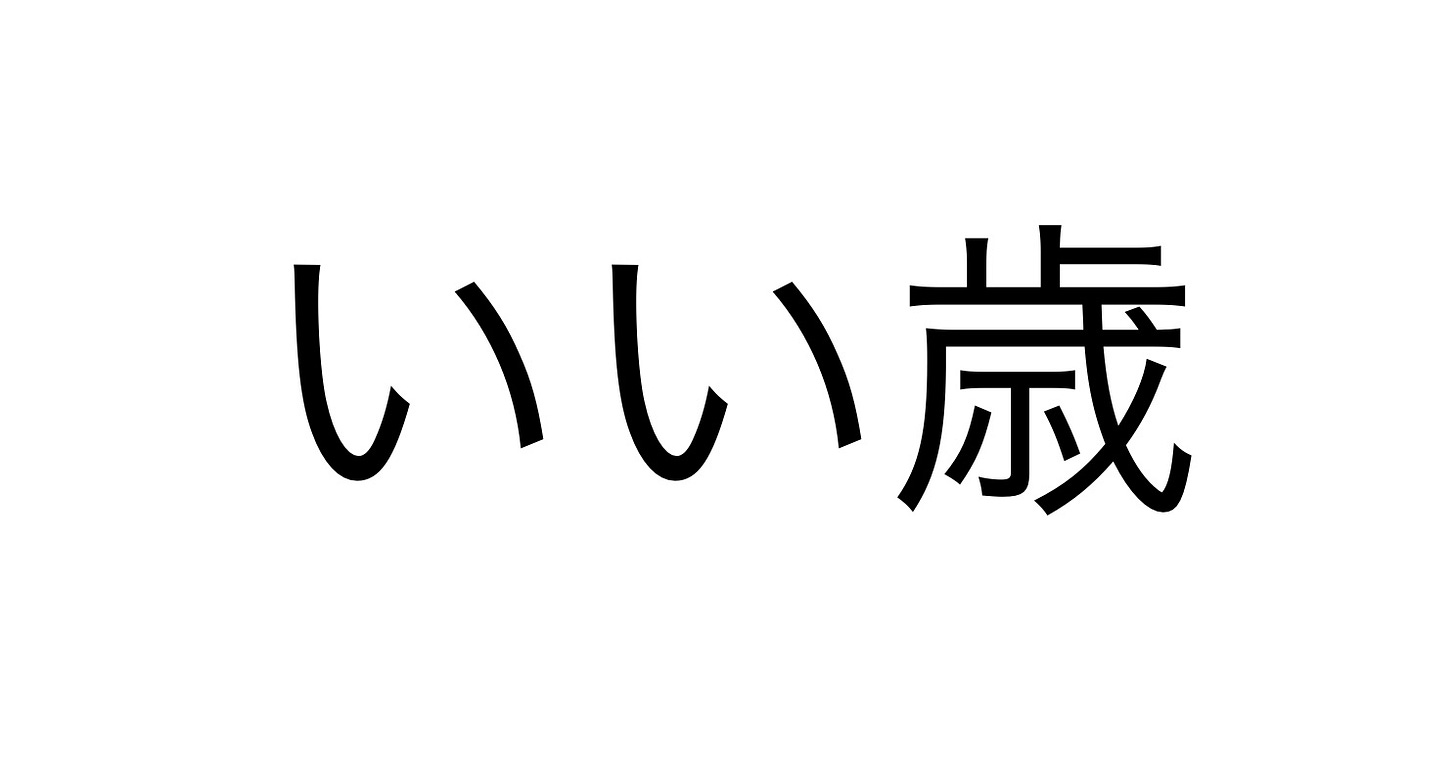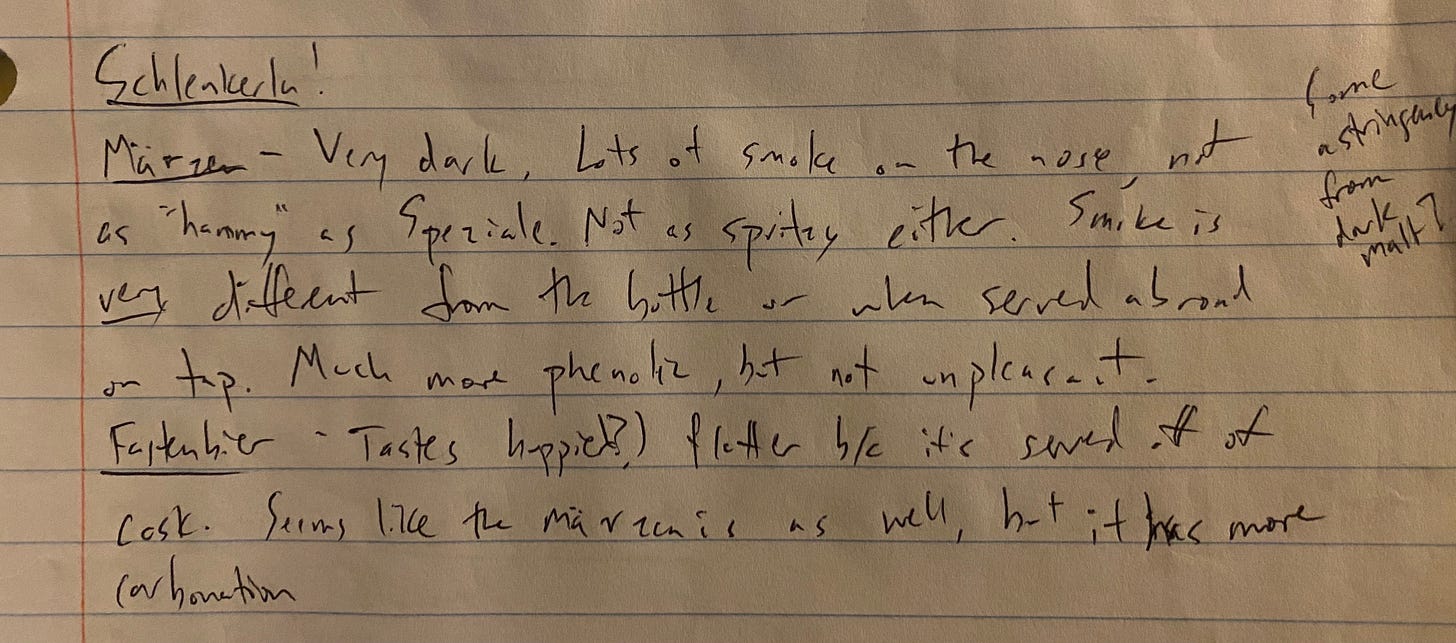いい歳
How to Know You're in the Good Old Days - How to Japanese - May 2021
This is How to Japanese, a monthly newsletter with something about Japan/Japanese, something about booze, and a dash of いろいろ.
日本・日本語: Getting Better All the Time
I have a significant birthday coming up later this year, and it’s had me thinking about the phrase いい歳 (ii toshi), which literally means “good age” but is probably more accurately translated as “sensible age,” at least in a vacuum without any context.
The dictionary provides two definitions, and I’ll give the second definition first since it’s the simplest:
相当な年輩。「先生も、もう好い年だろう」
Considerably old. “Sensei, you’re starting to get pretty old yourself.”
This translation might even work with something like “You’re starting to get up there.”
(On a slight side note, the dictionary lists the kanji as 好い年, but the most commonly encountered versions these days are いい歳 and いい年. For reference, at the time of writing, Google hits are as follows: いい年 = 4.48 million; いい歳 = 4.36 million; 良い年 = 2.08 million; 良い歳 = 795,000; 好い年 = 12,600; 好い歳 = 1,420.)
This is the definition I had in mind when I was thinking about myself. But it’s funny. I feel much better equipped to face this significant birthday (and not nearly as aged) than I did my last birthday of decadal consequence. For the last one, I was deeply unhappy and languishing in grad school, so of course it seemed like an unpleasant thing to have happen. I responded in a relatively benign, healthy way: I ran a 10K every day for a week or two straight. Just on my own around New Orleans. And then I went back to my usual routines.
Every year I’ve gotten away from that period in time and that version of myself has been a blessing.
Which brings us to the first dictionary definition, ironically something I did not have 10 years ago:
十分に分別のある年齢。多く、年齢に不相当な行為などをあざける気持ちを含んで使う。「好い年をしてばかなまねをするな」
An age with sufficient good judgment. Often used in a manner to scold someone’s actions as inappropriate for their age. “Act your age and quit being such an idiot.”
A looser translation might be something like “Grow up” in this case, but “Act your age” does a good job of paralleling the Japanese enough to ask the question, “What age/歳?”
I looked into this (which reminds me of when I looked into the line between お姉さん and おばさん for the JT), and there are a variety of answers. 30 and 40 get thrown around a lot, but an Oshiete! Goo commenter aptly notes that いい歳 is in the eye of the いいholder, as it were:
いう人の年齢により違うと思います
私がもう38歳ですからというと
同年代はもうそんな歳なんだ
結構いい歳なんだね
と言います
20歳以上離れた方からは、まだ若いと
言ってもらえます
逆もあります
19歳の新入社員が自分で
もうすぐ20歳ですよ、いい歳ですよねと
いいますが
私からしたらまだまだ若いです
I think that varies based on the age of the person saying it.
I’m already 38, so I’d say people my age are getting to be there. We’re pretty old.
People 20 or more years older would tell me I’m still young.
The opposite is also true.
A 19-year-old new employee could tell themself, I’m going to be 20 soon, I’m pretty old, but from my point of view they’re still young.
Another commenter is more decisive:
若いは18歳まで、いい年は40歳から
22歳は中途半端!
You’re young until 18, and you’re いい年 from age 40
22 is kind of in no man’s land!
It’s fun to read what people think about this topic. You run into fun words like アラサー (arasā, around thirty), アラフォー (arafō, around forty), and アラフィフ (arafifu, around fifty).
But you do need to be careful with this phrase, both in English and Japanese. It’s basically a subjective criticism of the way someone (disproportionately women and the young) chooses to live and act, and this article about how to respond when someone uses いい歳 against you notes how it can feel:
グサッときますよね。鋭利なナイフでグサッとですよ。
It cuts deep. Deep like a sharp knife.
The phrase is so pervasive that this writer caught herself self-applying it and wrote an excellent post about what it means and how she intends to live. It’s the best piece of writing I’ve read about the phrase.
She even includes the Google search autocomplete, which has “いい歳して ポケモン” (basically asking what age is too old for Pokemon lol). Her final judgement:
本人の自由だし、自分自身の選択。
People are free, it’s their choice.
Her post is worth a read, and I don’t want to spoil how nice her last line is with my translation here. Go read it!
And also go easy on yourself. On the podcast the other week, I spoke about how a little self-analysis can help prioritize what’s important in life, and how I used it to reorient myself in the middle of the pandemic when I wasn’t spending my free time doing what I really wanted to be doing (studying Japanese and helping others learn it). As our writer above shows, self-analysis can also reveal what artificial limits we’re placing on ourselves.
Fortunately, I’m now proud to be いい歳 and feel like I’m only getting better each year.
ビール: Mindful Drinking
How much do you remember about your last pint of beer?
Could you write five words about it? 50? 500?
What color was it? What did it smell like? What did it taste like? Was it thin and watery or thick and syrupy? Somewhere in between?
I imagine a lot of the details have evaporated or are just out of reach. You can probably approximate the color (amber, gold, black?), but I imagine the aroma and flavor are more nebulous. Aroma and flavor can be difficult to describe when you have the beer right in front of you!
I’ve written previously about how certain flavors can be difficult to access. But accessing them is only one half of the equation. The other half is having the right vocabulary to describe what you’re perceiving.
A non-beer example: I’ve continued my exploration of agave distillates through Agave Mixtape, and I continue to be lost. I can’t orient myself as I’ve been able to with beer. I thought this might be due to high proof, which definitely messes with my sinuses, but I’ve done fine with rum. (I do think that some varieties of rum should almost have their own separate categories, though.)
However, I can be trained. Agave Mixtape held a Zoom tasting, and one of the organizers mentioned that Lalocura San Martinero always made him think of “grapes” and “grape soda.” This wasn’t one of the three samples in this month’s set, but I happen to have a bottle of San Martinero, so I went over and opened it, and sure enough, the grapes jumped out of the bottle. It was so immediately obvious.
The same thing happened with Neta’s Bicuixe and Madrecuixe in other sets. The former has notes of cinnamon and Red Hots candy, while the latter is ginseng and peanut shells. I can distinctly remember hearing the tasting host say the word “ginseng” and the array of smells and tastes I was experiencing coalesced into that single descriptor.
Part of it just takes time, and I’ve had more time with beer and am far more familiar with the brewing process. Craft beer and homebrewing also has a structure to bring new fans into the fold and equip them with the skills to better appreciate beer. The Cicerone Certification Program trains beer servers, and the Beer Judge Certification Program certifies judges for homebrewing competitions. I don’t think the same is true for other spirits yet, and the support that does exist looks expensive to access.
But what’s the best way to go about expanding your ability to perceive and describe beer? And what would be the benefit of doing so?
I think there are three main steps to do this efficiently:
1. Study beer descriptors.
Don’t draw the map from scratch: Arming yourself with the vocabulary used to describe beer is an easy way to give yourself guideposts. This website isn’t perfect, but it’s a good start and divides the descriptors into clear categories. A BJCP score sheet (PDF) is also a useful way to structure an evaluation, and the off flavor descriptors along the left side are particularly helpful when encountering bad beer.
2. Actively take notes.
I know it’s annoying, pretentious, and distracting when you’re out drinking at a bar, but even a few quick notes can help extend your experience with the beer, and doing so consistently will build practice. I’ve taken extensive notes for two beer trips in Europe (I lost the thread during my third trip but did take some notes). Some of these notes are better than others. I clearly made an effort at Schlenkerla, the legendary Rauchbier brewery.
One of the more helpful exercises was writing this up into a best-of list after the trip. It’s been six years, but I can close my eyes and hold on to some of the sensations, like having a spritzy, unfiltered Unetice Czech light lager in place of dessert on the terrace of a building overlooking Prague, and the Ungespundetes lager at Spezial - I really went for unfiltered lagers that trip.
3. Drink more.
Obviously, more beers means more practice honing your perception and descriptive abilities.
Which brings us to the benefit.
In short, mindful drinking is better than mindless drinking. It’s more fun, more fulfilling, and safer. Forcing yourself to describe the beer is a system that can help you be more mindful. Taking a moment to really examine beer flavors is also a way to make time slow down. It’s a bit of a Ferris Bueller cliche at this point, but things move quickly. You’re more likely to remember them if you pause to examine what exactly it is you’re enjoying.
いろいろ
There is a serious reckoning happening in the craft beer world with regard to sexism. It started as a call for comments on Instagram and has grown. Read more here.
I was in The Japan Times with one of my favorite pieces I’ve ever written - how to see the future in Japanese.
Matt Alt has an excellent piece in The New Yorker about calls to cancel the Olympics, calls that have gradually been increasing in volume: Japan's Olympic-Sized Problem.
I made a playlist of music I listen to when writing/working: Focus Playlist. I have to say, it's pretty damn good.
This was a gripping read: “The Diplomat Who Disappeared.” (I’m giving it the title from the print version because I think it’s better than the digital version.) Stick with it to meet the sociopathic version of Forrest Gump. The amount of work the writer put into the piece doesn’t become apparent until the final paragraph.
I’m glad I saved this link: 神田の写真. As part of the ほぼ日刊いとい新聞, the photographer Katsuo is taking photos of Kanda. It makes me super 懐かしい for Tokyo - I usually stay in Kanda when I’m there for business because it’s so conveniently located. Each photo has a short post paired with it, so there’s good reading practice. 30 entries so far and growing.
We were denied Wii Snorkeling music.



